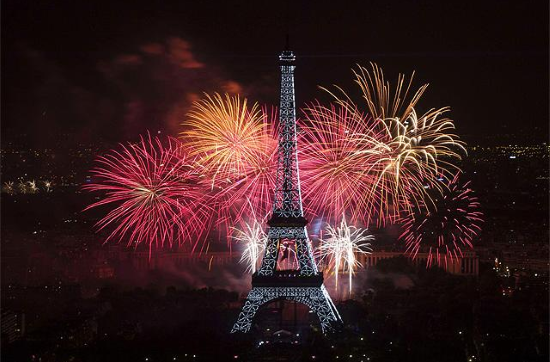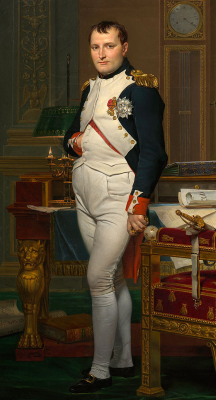
On July 14th, the world celebrated Bastille Day, the French equivalent to the 4th of July. This day commemorates the French peasantry’s storming of the Bastille at the beginning of the French Revolution.
This occurred only 13 years after the American Revolution, and there was pressure on our government to provide assistance to the French revolutionaries. Today, it’s easy to think that anyone who hates oppression should cheer for and sympathize with the French holiday.
However, not all revolutions are created equal, and the French Revolution was in diametric opposition to both the principles of the American Revolution and the principles of Scripture. Worse, the philosophies behind the French Revolution have been creeping into American thinking. Here’s an analysis of where the French thinking went wrong.
1. Revolutions can make bad situations worse.
No one is arguing that the France had real problems. The Middle Ages were still going strong for the French peasantry, who suffered poverty and tyranny under a harsh ruling class and an even harsher system of government. The country was poor. Innovation and entrepreneurship don’t exactly flourish when you have to work the farm day and night just to pay the Baron’s rent (hopefully you’ll have enough left to feed your family).
That said, there are both good and bad solutions to problems. Government is always on a sliding scale with tyranny on one end and anarchy on the other. You want to sit comfortably on the middle, which is responsible self-government and freedom. When you’re sitting on the tyranny end, the only way to make matters worse is to slide all the way to the anarchy end.
2. Freedom can’t exist without law and government.
The French people thought that tyranny would die with the government they dismantled. Instead, what they got was chaos. Peaceful citizens had to watch their step and draw as little attention as possible. If you disagreed with the regime, you would likely end up at the guillotine. Property and life weren’t safe, especially if you were of the nobility. And you can forget due process.
True freedom is when your life and property are safe and when you can live your life as you see fit. But what the French people didn’t realize is that every man’s rights meant limitations for everyone else. If I have a right to my property, you may not take that property. Certainly law can be used to take freedom, but it’s impossible to preserve freedom without it.
“If men were angels, no government would be necessary.” – James Madison
Not being angels, human beings will always need government.
3. God is the source of freedom, so to enjoy freedom, you have to do it on His terms.
The immortal words “government of the people, by the people, for the people†were originally penned by John Wycliffe in the prologue to the first English Bible:
“This Bible is for the government of the people, for the people and by the people.â€
Wycliffe was making an observation that most of our pastors today miss: freedom is entirely based on Scripture. For the Bible to have the sway in our lives that God intended, we have to be free to live according to it as our consciences dictate. This is why political freedom came only after freedom of conscience during the Reformation.
If God’s Word is what establishes our right to freedom, then we have to keep the laws that He establishes. If you throw away God’s law, you also throw away the very basis for every right that you have. This is why the American Founding Fathers were so outspoken about the need for religion in society:
“He is the best friend to American liberty who is the most sincere and active in promoting pure and undefiled religion…Whoever is an avowed enemy of God, I scruple not to call him an enemy of his country.†– John Witherspoon
The French people had long since rejected God. After having driven out the Christian influence as the Huguenots fled the massacres and persecutions, France had embraced the humanistic thinking of Enlightenment scholars who rejected God. Consequently, they rejected every form and vestige of religion in the Revolution. Which leads us to the next point….
4. Without religion and morality, revolution always leads to excess and atrocities.
Revolution is a very intoxicating beverage. When people suddenly realize that the restraints of government are no longer there, things get crazy fast unless there’s an inner moral compass to restrain everyone.
The French Revolution is a tragic example of this. The chaos, wantonness and killings weren’t incidental. They were the direct result of the nature of this revolution. This is why Charles Dickens called the French Revolution “the worst of times.â€
5. Anarchy always leads to more tyranny.
Perhaps this is the most tragic part of the whole saga. Human beings desperately need and crave order. When you’ve had anarchy for a while, people become desperate for anything that can put a stop to it all and reintroduce order and security. Unfortunately, that usually means another tyrant.

This is alluded to in the 2012 musical Les Miserables (based on the next French insurrection less than 50 years later), as the character Gavroche sings:
“There was a time we killed the King;
We tried to change the world too fast.
Now we have got another King,
He is no better than the last.â€
The American revolution was based on the laws of nature and nature’s God; the French revolution was based on the complete absence of both law and acknowledgement of God. As Margaret Thatcher said:
“Human rights did not begin with the French Revolution; they stem from a mixture of Judaism and Christianity. We had 1688, our quiet revolution, where Parliament exerted its will over the King. It was not the sort of Revolution that France’s was. ‘Liberty, equality, fraternity’ — they forgot obligations and duties I think. And then of course the fraternity went missing for a long time.”
The French Revolution was the complete antithesis of everything America stands for, and brought greater suffering and ruin on France than ever. We should mourn on Bastille Day, not celebrate, and guard against those principles which could create ruin in our own country as well.
1 comment
Comments are closed.